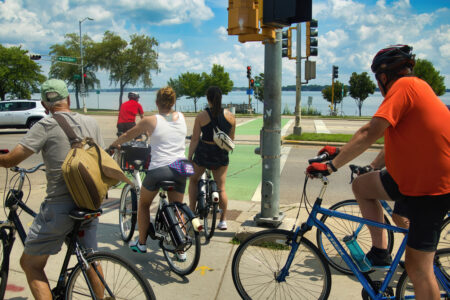
Share On Social!
The National Academies of Sciences, Engineering, and Medicine (NASEM) has nominated an ad hoc committee to review federal policies that contribute to racial/ethnic health inequities, and recommend the most effective, promising approaches to equitably change policies.
NASEM is seeking public comment on its nominees for the committee through June 20, 2022.
The nominees are strong, diverse health equity experts.
But none have experience in urban planning, housing, or transportation – some of the most critical social determinants of health.
Use the following Salud America! model comment to tell NASEM to add committee members who are scholars in the intersection between urban planning and social determinants of health to improve their ability to make equitable policy recommendations.
Submit Comment for Urban Planning Scholars on NASEM Ad Hoc Committee
Submit the comment below, personalize it, or craft your own unique comment.
Subject: Add Urban Planning Scholars to New Ad Hoc Committee Reviewing Federal Policies
Dear NASEM,
I am writing because I appreciate your new ad hoc committee that will review how federal policies contribute to health inequities – but I strongly believe the committee needs to add scholars in urban planning, particularly regarding housing and transportation.
Due to historic discriminatory planning practices, American neighborhoods are racially, ethnically, and economically segregated and dependent on the automobile, both of which hinder equitable access to opportunity. By investing in auto-centric infrastructure and development, the government has eliminated the feasibility of competing modes of travel and resulted in auto-dependence. Despite massive public investment in roadways, American families continue to face various social, economic, and health consequences of inadequate transportation options.
Nationwide, the average household spends 24% of their annual income on transportation and 54% on transportation and housing combined. This means households are burdened by transportation and housing costs and have less money at the end of the month for daily essentials to stay healthy and thrive. Moreover, this means these households are facing threats so economic security and self-sufficiency, both of which are important for health promotion and disease prevention.
Transportation and housing cost burdens are worse for low-income families, with the average household below 80% AMI spending 27% of their annual income on transportation and 63% on transportation and housing combined. People of color also face disproportionate burdens. For example, the percentage of Latinos who are housing-cost-burdened grew from 42.4% in 2000 to 56.9% in 2015, according to a recent Salud America! research review (https://salud.to/healthequity). Years of unjust urban planning practices have cut Latinos off from opportunities for health and wealth, according to a recent Salud America! report (https://salud.to/transportationworkgroup).
A national committee that is exploring how federal policies contribute to health inequities is an admirable and much-needed effort.
But this committee should include professionals who understand the intersection between urban planning and social determinants of health. This will ensure the committee accounts for housing and transportation, key underlying elements of health equity.
Thank you
Why Is Housing, Transportation, and Urban Planning Important in Efforts to Build Health Equity?
Where you live matters for your health.
Inequitable urban planning, historic discriminatory practices like redlining, and other inequities have created racial/ethnic wealth gaps in neighborhoods.
Latino neighborhoods, for example, struggle with equitable access to healthy food, safe places for physical activity, affordable housing and transit, social support, and healthy school environments.
These communities have a much harder path to health equity, where everyone has a fair and just opportunity to live their healthiest life possible.
Latinos and other racial and ethnic populations are often dependent upon public transportation and affordable housing, according to a Salud America! research review.
“In urban areas, transit-oriented development would benefit Latino communities if structured in a way that expands affordable housing options and limits the risk of gentrification, so that Latinos in the community can maintain their social and cultural networks while gaining access to high-quality public transportation,” according to the research review. “Addition of green space and sustainable transportation options such as greenways and bike paths would further improve connectivity of communities. This also would increase recreational space for children and adults, and improve the physical and psychological well-being of all residents.”
“A common theme is the need for community activism to ensure that development projects consider the concerns and desires of Latino residents when implementing affordable housing, public transportation, and green spaces. With proper political will and community activism, change is possible.”
By The Numbers
27
percent
of Latinos rely on public transit (compared to 14% of whites).



